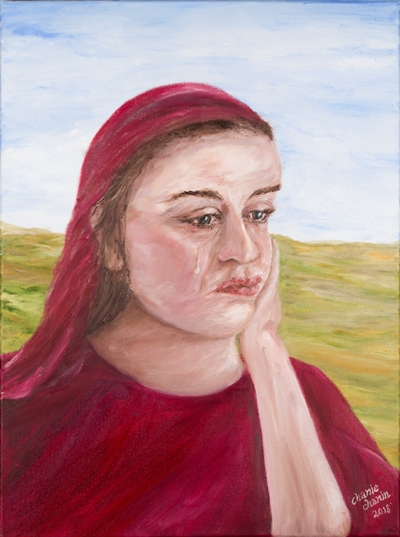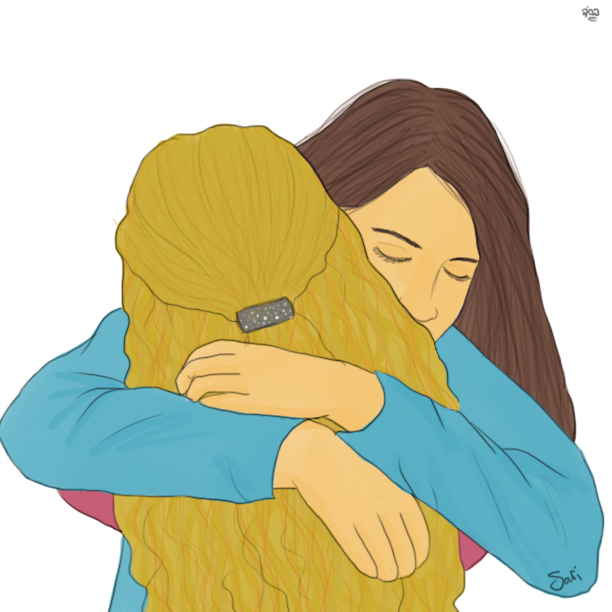
I grew up in Jerusalem, a happily adjusted child in a warm and loving family. By nature, I was on the shy side, but I had a wide circle of good friends. We traipsed the country from north to south, maneuvered our way through the ups and downs of high school, strode hopefully into adulthood, and with resolve, entered the world of work, full-steam ahead. And my resolve paid off, because by the age of 22, I was already a manager of 30 plus people.
When I was 26, I married my husband, Ari. We met in Israel, but he lived in America, so one week after our wedding, I packed up my life and moved across the vast ocean that separated me from my family, friends and budding career.
My first year in America was spent acclimating to a strange culture and being a housewife. During that year, I became pregnant and decided that I did not want to go back to work, but that I preferred to be home with my children, and so I put my career on hold. In the course of the next four years, I was blessed with two more children. I was busy and happy.
*******************
It was Shavuos of 2010. I had recently returned from a short trip to Israel the evening before. Since I love cooking and entertaining, I went all out as usual. The first evening after dinner, I collapsed on the sofa into a deep sleep. My husband decided to stay at home for learning that evening.
My heart was racing, sweat was pouring down my shaking body, and my breathing was shallow. My heart felt as if it were pushing its way out of my chest.
At 2 a.m., I awoke on the sofa and attempted to head to bed for the rest of the night. But I felt as if I were dying. I screamed out to my husband who tried to calm me, but I insisted that I was having a heart attack. The symptoms escalated rapidly during the next half hour. My heart was racing, sweat was pouring down my shaking body, and my breathing was shallow. My heart felt as if it were pushing its way out of my chest. My husband tried to calm me down, but eventually had to call Hatzalah when I passed out. They rushed me to the emergency room with an irregular heartbeat.
After many tests and blood work, the doctors told me that I could go home. They said I was fine. I still felt like my heart was racing and would soon push its way out. “You are making a serious mistake,” I told them.
The doctors explained that what I had undergone was a panic attack, and while I was experiencing myriad symptoms, my body was actually healthy. It was my mind that was compromised.
When the doctors pronounced this diagnosis, I went into research mode. I had heard the term “panic attack” bandied about often, but in truth, I had no idea what it meant.
For three months, I attempted to rope in this monster which resided in my mind. I tried to escape the pain and make believe nothing had happened. But even the most mundane chores became a monumental effort. Getting out of bed or organizing the children’s carpool felt as if I were attempting to cross the English Channel in a rowboat without oars.
The “I” that I had been no longer existed. My consistent fear was having another panic attack, which unfortunately recurred many times in the span of three months. By erev Tisha B’Av, anxiety and depression had infiltrated and usurped my mind, along with the panic. I asked my mother to take the next flight out from Israel to New York. I needed her by my side to face this monster. She arrived the day after Tisha B’Av. Together with Ari, they sought the best doctors, psychiatrist and healers to rescue me from myself.
The more I denied the pain, the more it increased. There was no escape. I needed to dismantle my agony and figure out where it should be stored. I yearned to find my old self, but was lost in a maze of mental illness; I wasn’t sure which way to turn.
With medication, some of my symptoms began to subside, but I had taken up residence in the pit of depression. I didn’t want to open my eyes. Leaving my bed was like skydiving into the unknown, so I kept under my covers most of the time.
The psychiatrist explained that it wasn’t a matter of popping pills. I needed to heal, emotionally and physically, from the trauma. This would take months of visits to doctors and healers, tweaking medication and braving the battle with depression.
My children looked at me as if a stranger had taken up residence in their home. She had, and I wasn’t happy to share my life with her.
Trying to grapple with the onerous load of depression and anxiety, I felt that I was drowning and needed help. But how could I get help without letting people know I was in need? My level of functioning was almost nil, and someone needed to step in and fill the roles I was no longer managing.
Not everyone will be as lucky as I was. My husband was—and is—supportive, loving, understanding and there for me. Carpool, meals, shopping, homework—either he did it, or he got someone else to do it. And he listened to me. My fears, my worries, my demons. He listened to it all and reassured me. Not many are able to do that.
My name, “Matana”, means “a gift”. Hashem has blessed me with a one-of-a-kind husband, five incredible, rambunctious children, a partnership in several thriving enterprises…and panic attacks, anxiety and depression.
My friends and family also listened when my husband was being both father and mother to my children. There was one friend in particular who didn’t just step up to the plate, but arranged the game, and was the coach and players. When I was taking refuge from the world which seemed too scary and intimidating, Mimi was there to listen and support me. Daily check-ins to monitor my mood would alert her if I was in a downward spiral. She would show up, sometimes with a milkshake, coaxing me from one sip to the next to get emotional and physical nourishment.
It is easy to just wallow in fear. Mimi championed me to take mini-steps away from that fear and draw closer to a world which looked possible to rejoin. She proved over and over that she was with me, and she cheered me on with each milestone. Eating a sandwich. Taking a shower. Leaving the bedroom. Going outside. Making a phone call. Through it all, Mimi was my staunch supporter. When I wanted to ease back into the nether land, Mimi chided, laughed and challenged me to keep going. Never judging, always reinforcing.
What is interesting is that Mimi had not been my best friend. Not even a close friend. More of an acquaintance. But when she heard that I was down for the count, she showed up. Today, we are like sisters.
Not everyone has a Mimi in her life. But one can find someone who can do some of what Mimi did. Reaching out and saying you need help is the important first step. Friends and family may be close, and yet still feel awkward to show up without your okay.
Not every person is built to be a support. It doesn’t mean that there is something wrong with him/her. It just means that that person doesn’t have what it takes. If the person you reach out to fails your expectations, try again with someone else. Getting out of the swamp of depression by yourself is an almost impossible feat. Reaching out to someone standing on firm ground can help hoist you upward.
At times, you will receive a chilly or non-response to a request for help. Don’t let it hamper your quest for assistance. Find the person who is equipped and ready to be with you emotionally. Life is elevated when you can share it with someone else. And that someone may not turn out to be your spouse or your close friend. Just keep searching until you hit gold.

Today, nine years later, with two additional children and seven years off of medication, I am not the person I originally was. I am a new and improved Matana.
My name, “Matana”, means “a gift”. Hashem has blessed me with a one-of-a-kind husband, five incredible, rambunctious children, a partnership in several thriving enterprises…and panic attacks, anxiety and depression. Having been gifted a new life after being stricken, I am committed to helping others who are grappling with mental health problems or have a loved one who is.
Find the person who is equipped and ready to be with you emotionally. Life is elevated when you can share it with someone else. And that someone may not turn out to be your spouse or your close friend. Just keep searching until you hit gold.
At an extremely low point, doubting if my life was worth fighting for when it involved so much pain, I made a vow to Hashem. If I recovered, I would dedicate time to share my journey; I would shatter the silence around mental health issues and let others know that they are not alone. That there is hope beyond the pain. I’ve started both a podcast and a blog which are designed to bring inspiration, motivation and some practical tips to those who are battling depression and anxiety, and to those who are supporting loved ones who are going through this difficult journey. In a world of mental health problems, together is better. Reach out and find your Mimi.
The more you share with the right people, the more you will realize you are not alone. The battle you are engaged in has been fought by many others—some of whom you may know, but were unaware had visited the same battlefield. Knowing you aren’t alone shores up a battered self-image and injects you with the belief that you will emerge victorious, to live and relish life once again.